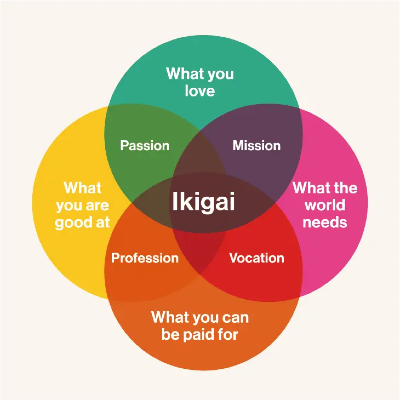Rethinking Ikigai

By now, most of us are familiar with the concept of ikigai, a Japanese word that roughly translates to "a reason for being" or "a reason to wake up in the morning". The idea has been closely associated with Okinawa, one of the world's "blue zones" (regions known for longevity), where many centenarians attribute their long lives to having a strong sense of purpose. It was popularized in the West by the book Ikigai: The Japanese Secret to a Long and Happy Life (2016).
Traditional Japanese meaning
In Japan, ikigai is not necessarily tied to work or financial success. It can be found in small daily joys, relationships, hobbies, or contributing to society. The elderly in Okinawa interviewed for the book shared that their sources of ikigai included friendships, gardening, and art, which keep them engaged and motivated each day.
Western interpretation
As ikigai gained popularity in the West, it became a staple in personal development circles, often reframed as a structured approach to career success and personal fulfillment.
You've probably already come across the widely circulated Venn diagram that positions ikigai at the intersection of what you love, what you are good at, what the world needs, and what you can be paid for. While this framework offers an interesting way to think about purpose, it can inadvertently introduce pressure to align one's passions with professional success, potentially leading to stress rather than fulfillment.
I strongly believe in the importance of living a meaningful life—after all, intentional living is the core theme of my blog. But I also remember feeling frustrated when I first tried to "find my ikigai" and fit my life neatly into this model. Real life is rarely so straightforward.

Back to the basics
There’s nothing wrong with aligning your passion or mission with your job. But ikigai is more than that—it’s a way of being. And we can still reconnect with its original essence outside of work. Here are a few ideas.
- Finding joy in simple, everyday activities, whether it's savoring a cup of tea, taking a walk in nature, or spending time with loved ones.
- Engaging in activities just for fun, without having to somehow monetize them. This reminds me of an article I shared in one of my past "Friday Musings", where the author discussed self-worth in the digital age and argued that nearly every activity today has become a metric-driven pursuit, including our hobbies, friendships, and personal experiences.
- Nurturing social connections, as strong social ties are a key component of ikigai.
- Doing random acts of kindness or volunteer work, which can enhance our sense of purpose and fulfillment. This brings to mind a post I wrote on the many benefits of the "kindness loop".
A new take on the concept
Dr. Chatterjee, whose YouTube channel I happily chanced on during the Christmas holidays, offered another spin on ikigai that I found useful. In one of his podcast episodes, he shared that, for him, a purposeful life is one where we're living in alignment with our values—where our external actions match our internal values.
Among other things, he discussed how this idea that we all have to find "the big thing" we were put on Earth to do—this wonderful passion we're good at, that people desperately need, and will gladly pay for—is setting a really high bar. In fact, it's probably setting too high a bar for most of us.
What he recommends instead is starting from our values. For example, if we value kindness, we can bring that into every aspect of our lives—being kind to the barista, to our colleagues, to our neighbor, and so on. We may still be in a job we're not thrilled about, but living in alignment with our values will surely bring us more joy and fulfillment.
On the flip side, not living in alignment with our values creates a disconnect that can lead to unhealthy behaviors. Rather than worrying about finding this deep core passion that we can monetize, Dr Chatterjee suggests we start by writing down our core values, regularly assessing how well we’re living by them, and making small adjustments along the way.
Final thoughts
So, what if this quest for the "ultimate ikigai", that perfect overlap in the diagram, is actually robbing us of joy? How can we find our purpose in a way that feels less stressful?
Speaking of purpose, I don't know if this is my ikigai, but something I do feel called to do right now is to share my journey toward intentional living and offer a sympathetic ear to those who need it. That’s why I offer free "mindful chats"—a safe space for you to be heard and explore what’s on your mind, and a way for me to connect and better understand how I can create content that resonates.
Feel free to leave your insights in the comments, and if this post resonated, please share it with someone who might find it useful.



Member discussion